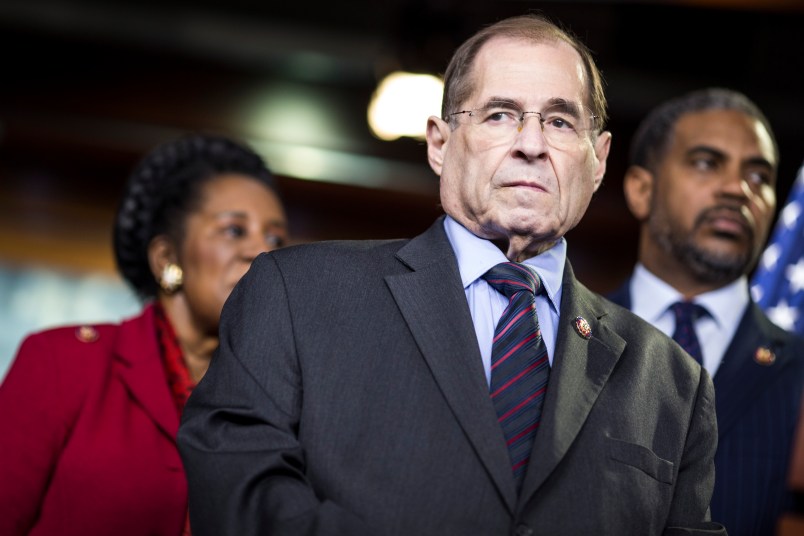By a 24-16 vote, the House Judiciary Committee voted Wednesday to recommend holding Attorney General Bill Barr in contempt for his refusal to turn over to Congress an unredacted version of special counsel Robert Mueller’s report and its underlying materials.
President Trump asserted executive privilege Wednesday over the documents, which the Committee had sought via subpoena.
The vote escalated the ongoing standoff between Congress and the Trump administration over House Democrats’ efforts to oversee the White House.
“This is not a step we take lightly,” Judiciary Committee Chairman Jerry Nadler (D-NY) said. “It is the culmination of nearly three months of requests, discussions and negotiations.”
But the hearing eventually devolved into a larger war over the prospect of impeaching President Trump, a potential outcome of obtaining the full report that wasn’t mentioned explicitly until more than an hour after the hearing began.
“This is all about impeaching the President,” Rep. Matt Gaetz (R-FL) said, after Rep. Hank Johnson first dropped the i-word while discussing why Congress needs the full Mueller report and investigative materials.
While other subpoenas have been issued by the House — and ignored by the administration — the fight over the Mueller report is the first to reach the contempt phase under the Trump administration. Whether Barr is obligated to hand over the documents Democrats are seeking is likely be decided by courts, setting up a constitutional clash over the separation of powers.
When President Obama was in office, House Republicans held Attorney General Eric Holder in contempt for the Justice Department’s refusal to turn over documents related to the Fast and Furious gun-running scandal. Barr would be the second attorney general to be held in contempt if House Democrats move forward with the contempt resolution passed out of committee Wednesday. A contempt recommendation against Attorney General Janet Reno made it out of committee but was not voted on by the full House.
Rep. Doug Collins (R-GA), the top Republican on the Judiciary Committee, said Democrats were moving at “lightening speed” to contempt in this case, compared to the Holder contempt vote.
“Our democracy deserves better,” Collins said, later arguing that the “prestige” of the Judiciary Committee had been “diminished” by the Democrats’ actions.
The Justice Department has defended its handling of the Mueller report by arguing that Justice Department policy and federal law requires it to shield certain information within the report, as well as its underlying materials.
Specifically, the Trump administration has pointed to federal law — known as 6(e) — that keeps grand jury materials confidential; Democrats have called on Barr to seek a court’s permission to release it. Other redacted sections have to do with ongoing court cases for which there are gag orders in place.
“This is information we are legally entitled to receive and we are constitutionally obligated to review,” Nadler argued in his remarks Wednesday.
The Justice Department has also made available a less-redacted version of the report for select members of Congress to view.
On Tuesday evening, the Department warned that Barr would seek for President Trump to invoke executive privilege on the redacted parts of the report to prevent their release. Just as Wednesday’s hearing was starting, the Department released a letter informing the committee that Trump had in fact invoked executive privilege over all of the materials Congress has subpoenaed.
“Faced with Chairman Nadler’s blatant abuse of power, and at the Attorney General’s request, the President has no other option than to make a protective assertion of executive privilege,” White House Press Secretary Sarah Sanders said in a statement Wednesday.
Nadler offered an amendment that was passed Wednesday with the contempt resolution addressing Trump’s claims of privilege. It was introduced more three hours into the mark-up, which ultimately lasted more than five hours and included the consideration of several amendments.
Nadler said Wednesday he is still willing to work with the Department to find accommodations that would allow Congress to see the full report. But he said Wednesday’s move was not just about the administration’s withholding of the full Mueller report, but its stonewalling of most —if not all — Congress’ attempts at oversight.
“Our fight is not just about the Mueller report,” he said.”Our fight is about defending the rights of Congress as an independent branch to hold the President — any President — accountable.”
The marathon mark-up included sweeping speeches about the Constitution, Congress’ oversight authority, and the threat of foreign interference in elections. But it also was subsumed by wonky debates over whether Democrats were rushing the contempt process, the subpoena itself, and whether compliance with it would require Barr to break the law by releasing grand jury materials without a court order.
The committee passed an amendment, offered by Gaetz, clarifying that Barr was not being asked to break the law. However, that led to hours of debate over the underlying subpoena.
“We’re making a big mountain out of small part of this,” Nadler said of the dispute.
Committee Republicans raged at Democrats for the vote, accusing them of running a “character assassination squad,” asking Barr to break the law, and being motivated by a fear that Barr would “get to the bottom” of supposed FBI impropriety in opening the Russia probe.
Democrats pointed out that Republicans made similar demands for investigative materials underlying the Mueller investigation when they held the committee gavel.
Now, according to Johnson, Republicans were “aiding and abetting” President Trump in covering up Mueller’s investigation.






